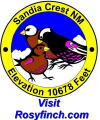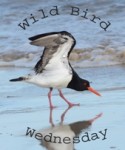 Update on the Rosy-Finches of Sandia Crest, New Mexico. The flag stopped waving on April 2nd, when the last flocks departed. There is great summer and fall birding in the Sandia Mountains and Central New Mexico. Check out the links in rosyfinch.com for more information.
Update on the Rosy-Finches of Sandia Crest, New Mexico. The flag stopped waving on April 2nd, when the last flocks departed. There is great summer and fall birding in the Sandia Mountains and Central New Mexico. Check out the links in rosyfinch.com for more information.
Bark Beetles, Three-toes
and Fire
Happily, New Mexico had a return to colder and wetter winters the past two years. We lived there during the unusually dry period that surrounded the turn of the century. Our pinyon pines were particularly under stress, and fell victim to bark beetles. Earlier this year, New Mexico water managers expected the biggest runoff in nearly thirty years. Yet, this spring brought hot and dry winds that dessicated the forest vegetation. The Manzano Mountains, just to the south of the Sandias, suffered a major fire.
 The preceding mild and dry winters had been kind to the bark beetles. They attacked the pinyon pine trees as never before in memory, leaving huge tracts of dead and dying trees. At higher elevations, drought-stricken Ponderosa Pine and fir trees were similarly afflicted. The trunks of fallen trees blocked trails and added a huge fuel burden to the forest floor.
The preceding mild and dry winters had been kind to the bark beetles. They attacked the pinyon pine trees as never before in memory, leaving huge tracts of dead and dying trees. At higher elevations, drought-stricken Ponderosa Pine and fir trees were similarly afflicted. The trunks of fallen trees blocked trails and added a huge fuel burden to the forest floor.
Before the Manzano fire, Sandia District Ranger Cid Morgan predicted, “Don’t be surprised if we have a large, catastrophic wildfire in the East Mountains.” Citing the low moisture and the great number of dead trees lying at the floor of our overgrown forests, Morgan says “you’re talking explosive conditions, and if we get a fire in there [the Sandias] we will not be able to put it out.”
Dead and dying trees, and the beetles that feed upon them, are also favorable to woodpeckers. American Three-toed Woodpeckers specialize in stripping the bark of weakened trees to get at the plump beetle larvae. Three-toes were absent from the Sandias for over ten years, but a pair appeared near Sandia Crest in 2005. They have been seen intermittently every year and have produced at least one brood. Last week they were reported again by Celestyn Brozek, an expert Albuquerque birder.
The best place to find three-toed woodpeckers is along the Nature Trail that runs to the south from Sandia Crest, as it approaches Kiwanis Meadow. The coordinates for this location are:
Latitude 35.204286
Longitude 106.443036
bark beetles to compose a symphony– LISTEN HERE)
(Photos are from US Forest Service, Southwestern Region;
more information about Bark Beetle Infestation here)
PARTIAL CLOSURES BEGIN ON SANDIA RANGER DISTRICT
(US Forest Service Press Release)
Albuquerque, June 14, 2008 –
Beginning June 16, 2008 at 8:00 am, portions of the Sandia Ranger District on the Cibola National Forest will be closed.
“Our fuel moisture’s on the south end of the district warrant additional restrictions for the safety of the community and resource“said Cid Morgan, District Ranger. “At this time, the area North of I-40 has received more moisture and we will keep this area open under Stage 2 Restrictions for now. If dry weather continues we will implement additional restrictions North of I-40”
Beginning 8:00 am, June 16, 2008, the following areas of the Sandia Ranger District are affected:
Sandia Ranger District – South of I-40: Stage 3 Restrictions (Partial Closures)
- Pine Flat Picnic Ground and Cedro Group Campground are the only areas open south of I-40.
- All Other Areas Closed South of I-40.
- No Hiking/Motorized Vehicles allowed in Back-country and on all Trails.
- No Campfires/No Charcoal/No Stoves (Cold Picnics Only).
- Smoking in vehicles only.
North of I-40: Stage 2 Restrictions
- No Campfires/No Charcoal.
-
Pressurized liquid or gas stoves, lanterns and heaters meeting
safety specifications are allowed. - Smoking in vehicles only.
- No motorized vehicles off roads.
For more information contact the Sandia Ranger District at 505-281-3304.
For further information about closures and restrictions in the Cibola
National Forest, information is posted on the internet at
http://www.fs.
Additional fire information for the Southwest Area is available at http://publiclands.
May through October, TUESDAY MORNING GUIDED BIRD WALKS in the Sandia Mountains, sponsored by the U.S. Forest Service and Central New Mexico Birders meet at 8:00 a.m. (8:30 in May and October) at the |
| Table and Spreadsheet of all Banding Results |












